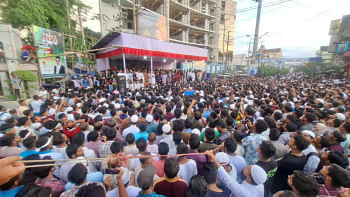Joy after 8 months of ordeal
Being locked inside a steel factory in Afghanistan's Herat city for almost a year, Ratan Mia and his 24 fellow Bangladeshi workers had lost all hope of seeing their loved ones again.
“My first child was born a couple of months after I had left. I thought she would never see her father as I was convinced I would die at the factory,” said the 30-year-old yesterday.
The International Organisation for Migration (IOM) and the Bangladesh foreign ministry took initiatives to repatriate the workers after several media organisations published accounts of their ordeal a couple of months ago.
A Flydubai flight carrying the workers touched down at Hazrat Shahjalal International Airport around 10:30am, Shakil Ahmed, an official at the IOM's Dhaka office, told The Daily Star.
The victims used to work at several steel factories on the outskirts of Dhaka. Attracted by the offer of handsome monthly salaries ranging from $500 to $800, they left home for Afghanistan on October 10 last year.
They took up the offer from an Indian national from West Bengal and paid him Tk 1 lakh to 1.5 lakh each.
“Stranded at the factory, I regretted my decision every moment. In the mean time, my wife and daughter were living in poverty and became dependent on my younger sister,” said Ratan, who used to earn over Tk 25,000 a month at home.
Another victim Faridur Rahman said his captivity changed his life forever.
“After being hit hard by poverty several months ago, my wife left my house with our daughter,” he added.
According to the workers, the Folad Steel Mill Co Ltd produced steel billets for exporting to Middle Eastern countries. It had around 100 employees, mostly Afghans. The Indian had managed only one month's salary for the 25.
The factory authorities even did not allow the workers to leave its premises, citing security reasons. They did not bother to extend the employees' visas in time.
When the Bangladeshis wanted to return home with funds from their relatives, the factory management said they would have to pay a hefty fine to the government for overstaying visas.
Ratan said they received salaries much lower than what they were promised. “We were actually paid for only two months. Then the factory was closed.”
In April, some of the victims' family members had filed a written complaint with the Afghan embassy in Dhaka against the factory owner. They requested the embassy to arrange safe returns of their relatives.
The workers' sufferings got exposure in Bangladeshi media after Ratan on July 24 had posted a picture on Facebook, showing the stranded victims sitting in the factory.
On August 10, The Daily Star ran a report about their plight and published follow-up reports.
“We are really grateful to the media. I thought I would never be able to see the daylight in Bangladesh again,” said another victim Sakaul Islam.
The IOM official said they had started working for the repatriation of Bangladeshis around two months ago. They contacted the Afghan authorities and the Bangladesh embassy in Uzbekistan to expedite the process. The Afghan government subsequently waived the workers' overstay fines.
Most of the returnees left Dhaka yesterday for their homes in different districts.

 For all latest news, follow The Daily Star's Google News channel.
For all latest news, follow The Daily Star's Google News channel. 



Comments